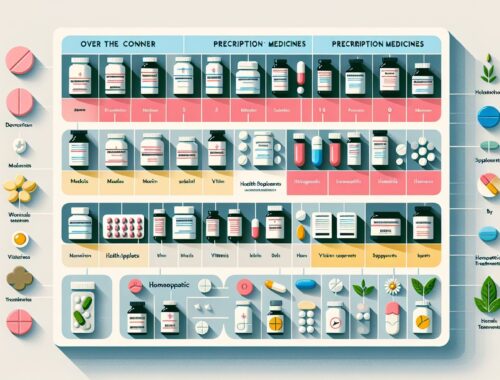
Understanding the Different Types of Medicines
When it comes to treating illnesses and maintaining our health, medicines play a crucial role. From over-the-counter remedies for common ailments to prescription drugs for more complex conditions, there is a wide range of medications available. In this article, we will explore the different types of medicines and their purposes, providing a comprehensive guide for better understanding their functions.
Over-the-Counter (OTC) Medicines
Over-the-counter medicines are easily accessible without a prescription and are primarily used to alleviate common symptoms such as headaches, fever, coughs, and allergies. These medications are generally safe if used as instructed and typically don’t require the supervision of a healthcare professional. Examples of popular OTC medicines include painkillers like aspirin and ibuprofen, cough syrups, antihistamines, and topical creams for skin irritations.
Prescription Medicines
Prescription medicines are drugs that can only be obtained with an authorized prescription from a licensed healthcare provider. They are crucial for treating and managing more serious health conditions, such as chronic diseases, infections, or mental health disorders. Prescription medications often require close monitoring by a healthcare professional due to their potential side effects and interactions. These drugs are carefully prescribed in specific doses to optimize effectiveness and reduce any associated risks.
Complementary and Alternative Medicines (CAMs)
Complementary and alternative medicines, commonly known as CAMs, encompass a wide range of treatments that are not considered part of conventional medicine. These include herbal remedies, dietary supplements, acupuncture, chiropractic treatments, and various forms of meditation or relaxation techniques. While many CAMs have been used for centuries and are believed to have potential health benefits, it’s important to consult with healthcare professionals before integrating them into any treatment plan.
Herbal Medicines
Herbal medicines are derived from plants and are a type of CAM. They have been used for centuries across different cultures to prevent illness, relieve symptoms, and promote overall well-being. Herbal medicines can come in various forms, including teas, extracts, capsules, or topical ointments. Common examples include echinacea for immune support, garlic for cardiovascular health, and St. John’s wort for managing mild to moderate depression. However, it is essential to use herbal medicines with caution, as they can produce adverse effects or interact with other medications.
Vaccines
Vaccines are an integral part of preventive medicine. They work by stimulating the immune system to recognize and fight against specific infectious diseases. Vaccines are responsible for significantly reducing the prevalence of various diseases worldwide, such as polio, measles, and influenza. They are typically administered through injections but can also be given orally or nasally. Vaccines have been proven to be safe and effective, preventing numerous illnesses and saving countless lives.
Conclusion
Medicines come in various forms and serve different purposes. From over-the-counter remedies to prescription drugs, complementary and alternative medicine, herbal medicines, and vaccines, each type plays a vital role in maintaining and restoring our health. It is essential to use medications responsibly, following professional guidance and advice from healthcare providers. Whenever in doubt, seeking medical advice is crucial to ensure the correct use, dosage, and potential interactions of different medicines. Remember, knowledge is key when it comes to making informed decisions about our health.
You May Also Like

Different Types of Medicines
December 14, 2023
Exploring the Different Types of Medicines
April 19, 2024

